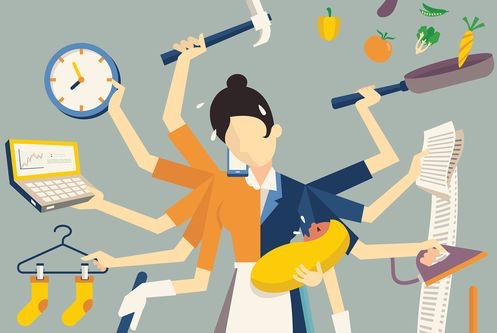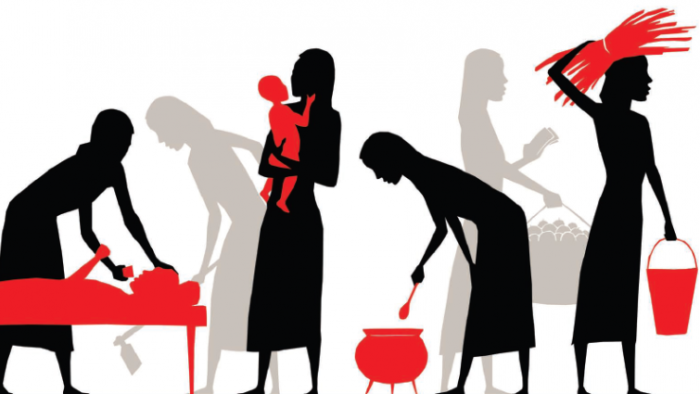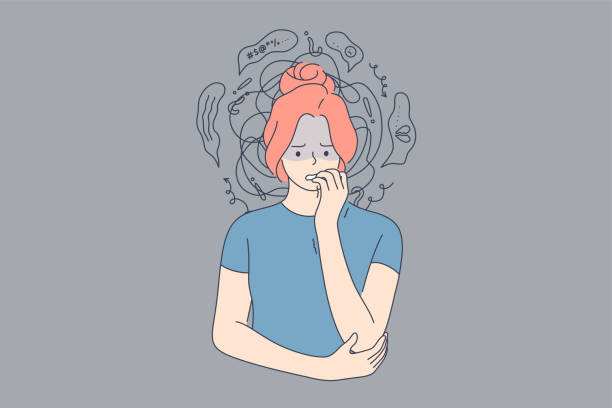
 Data Structure
Data Structure Networking
Networking RDBMS
RDBMS Operating System
Operating System Java
Java MS Excel
MS Excel iOS
iOS HTML
HTML CSS
CSS Android
Android Python
Python C Programming
C Programming C++
C++ C#
C# MongoDB
MongoDB MySQL
MySQL Javascript
Javascript PHP
PHP
- Selected Reading
- UPSC IAS Exams Notes
- Developer's Best Practices
- Questions and Answers
- Effective Resume Writing
- HR Interview Questions
- Computer Glossary
- Who is Who
The Concept of Unpaid Domestic Labor and How It is Practiced
Necessity is the mother of invention. It is difficult to keep up with the ever-growing needs and responsibilities of us humans. As adults, we are expected to perform many tasks every day without fail. We have to take care of our physical, financial, social, emotional, and mental well-being. It is more than obvious for us to delegate some of these responsibilities or work to a third party. The third parties perform simple tasks like taking your dog for a walk, regular cleaning of the house, taking care of sick elders, buying groceries, organizing your personal space, and others in exchange for money. In simple words, any activity that can be done by a third party instead of payment is known as "work." The domestic work an individual does that could have been delegated to a third party is known as unpaid labor in general.
The Concept of Unpaid Labor

Unpaid labor, also known as unpaid work, is the type of labor for which no direct remuneration is provided to the person. Unpaid labor generally falls into three categories of work:
- The type of work that is included in the gross domestic product (GDP) of the country. In this sense, the unpaid labor applied here is producing a product that is being traded in the market, but the person is not remunerated for the creation of the product.
- This labor is not included in the gross domestic product (GDP) of the country. This labor is produced and consumed within the household and is not traded in the market. Generally referred to as domestic labor.
In this article, we will be diving deep into the concept of unpaid domestic labor and its various impacts.

Individuals all over the world perform unpaid labor throughout their lives without getting any appreciation. This unpaid labor is emotionally, socially, and financially devalued. The convention dictates that it is their duty. If there is anything above domestic labor, it is not worth mentioning for society. Unpaid domestic labor is performed in the following ways:
Unpaid care for children and the elderly - Individuals at home are expected to take care of their offspring, sick individuals, and the elderly as part of their duty. It can be a costly affair if one appoints professional help for these three types of caregiving. The recipients of the caregiving are generally children, sick, elderly, or disabled individuals, but also include their spouses and friends. It forms most of the unpaid labor. Though the sentiment behind caregiving is precious, due recognition should be provided to the caregivers for their mental, physical, and emotional well-being. Economists have found that informal caregiving accounts for half of the country's gross national product (GNP).
Unpaid voluntary house chores - Like cooking, cleaning, washing clothes, regular maintenance work, gardening, grocery shopping, and others. According to the surveys, regardless of individuals' modernization and upliftment, women are expected to do the majority of household chores. At the end of the day, the burden of the household chores is on the shoulders of the women of the family; men can help them with the chores. With both men and women earning in today's era, we see a large injustice done to women. It is generally observed that men working from home can easily distinguish between paid work and seeking assistance with unpaid household tasks, whereas for women this line becomes blurred leading to a lot of stress and dissatisfaction for women. Working women are supposed to give their very best in the workplace and outperform in household work as well. They are suffering from the "double burden" problem.
Unpaid outside activities - It is very common in rural areas to see women fetching water from the well, growing vegetables in their backyard, or caring for livestock for meat and milk purposes. These subsistence activities, when done by the women of the family, are given no importance, but when done by a third party, they turn into a business. If the outputs from these activities are sold in the market, they would have been included in the GDP of the country.
Unpaid family labor - Women or children might be involved in the creation of goods or services or the supporting activities of the family business. These companies are typically run by male counterparts. The contribution that the women and children of the household make to the success of the business is unpaid and may incur a huge amount of cost if delegated to a third party.
After understanding what unpaid domestic labor is, let's understand the impact of unpaid domestic labor on different individuals, especially the women of the household.

Unpaid domestic labor causes a lot of stress for individuals. Irrespective of whether the person is participating in the nation's paid workforce, they are expected to do unpaid labor at home. They suffer from a double burden and, hence, major stress, less leisure time and too many expectations may lead to serious conditions like PTSD or depression.
Individuals are highly dissatisfied with their performance. There are high expectations regarding the quality and quantity of work that individuals should be doing while at home, irrespective of their participation in the paid workforce. This in turn causes a lot of dissatisfaction with the work done and gives birth to negative feelings.
Tired and has no energy left for other tasks. In most developing countries, individuals are involved in a lot of daily work that requires physical effort. Like cleaning, cooking, washing clothes, fetching water, taking care of the livestock and farms, and others. This causes extreme fatigue and burnout issues. They are physically and mentally exhausted because of the work and they are unable to devote time to their family or children due to the never-ending work.
Causes a lot of volatile, extreme, and undue behavior. The pressure and stress from work lead them to engage in unpleasant behaviors and activities in front of their families, for example, hitting their children and partners. This causes them mental agony as well.
The concept of unpaid labor may seem like a new term that has been coined recently, but it is something that has been practiced for generations. Unpaid domestic labor should be recognized and appreciated by companies and individuals to succeed in the long run. It is time that companies become more sensitive toward their employees and how they feel. Growing together is the only growth that matters.

